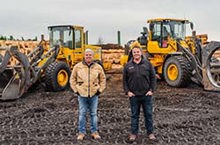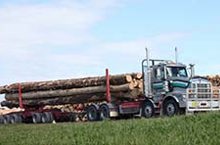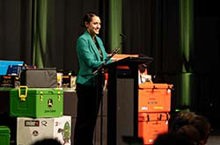
Rotorua and Scion are set to welcome one of the oldest and largest international organisations to the city in March 2024 for a conference dedicated to propagation technologies for forestry.
Founded in 1892, the International Union of Forest Research Organisations (IUFRO) is a non-profit, non-governmental network of forest scientists and researchers committed to voluntary global cooperation and knowledge sharing in forest-related research. With nine divisions focusing on specific areas of forest research, IUFRO’s influence is far-reaching.
The upcoming sixth international conference titled The might of vegetative propagation for healthy and productive forests to face climate challenges, will take place over five days, starting 3 March 2024.
Dr Jana Krajňáková, a senior researcher for tissue culture and project leader at Scion, is an integral part of the IUFRO 2.09.02 unit organising committee. She emphasises that this event will bring together researchers, university professors, and PhD students from around the world to collaborate, exchange knowledge, and address specific research topics in forestry, and more generally, woody plants.
“The programme sessions proposed will cover all fields of application of vegetative propagation to preserve, assess, improve, adapt, and deploy tree genetic resources in resilient and productive forests.”
Vegetative propagation technologies encompass various methods to reproduce plants without seeds. Examples of vegetative propagation technologies include cutting, grafting, layering, and tissue culture (micropropagation, including somatic embryogenesis).
Dr Krajňáková explains that in the context of rapid climate change, there is an urgent need for cost-effective, efficient tree vegetative propagation (bio)technologies for supporting the development of precision forestry and delivery of forest products and services.
“IUFRO serves as a platform for scientists and experts from around the world to collaborate on various aspects of forest research by facilitating communication and promoting the exchange of knowledge and expertise.”
Previous conferences have been successfully held since 2010 in several countries, including the Republic of Korea, the Czech Republic, Spain, Argentina, and Portugal.
“A level of prestige comes with being the host organisation. It demonstrates our leadership, expertise, and commitment to evolving knowledge in vegetative propagation technologies, while providing the opportunity to highlight our recent advancements in this area,” she adds.
Scion has done significant work in vegetative propagation technologies, with many notable achievements, including developing and refining various vegetative propagation techniques (especially the promising somatic embryogenesis), developing and applying elite clonal forestry, and extensive research on tissue culture techniques for plant propagation.
Dr Henri Baillères, Scion’s General Manager for Forests to Timber Products, says that there is a marked societal dimension in forestry through the historically strong and practical involvement of Te Ao Māori.
“As part of this, there is going to be a dedicated space for Māori researchers to present their research and knowledge experience in indigenous propagation.”
He adds that indigenous knowledge and practices are crucial in New Zealand’s forestry.
“This inclusion recognises the deep-rooted connection between Māori culture and the whenua and highlights the intersection of indigenous knowledge, sustainable forest management, and global collaboration, all of which are crucial aspects of the conference’s goals and objectives.”
With ForestSAT, an international conference on remote sensing technologies for forest monitoring and modelling, also planned for September 2024, Rotorua’s reputation as a centre for forestry and forestry science is further cemented. Additionally, Rotorua is scheduled to host the second international conference of IUFRO unit 1.01.04, focused on reinvigorating planted forest establishment research, in early 2025.
The conference organisers are now accepting submissions related to the vegetative propagation of trees as a primary strategy or in synergy with seed technologies to cope with climate change. Young researchers, particularly PhD students, are encouraged to submit proposals for a chance to present their work and receive all-expenses-paid trips.










